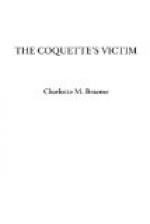“Colonel,” he said, “I have had quite enough of the ball. Are you ready for home?”
The colonel, who was quite satisfied with the result of the night’s work, declared that he also was ready, and they went.
“A very pleasant ball,” remarked the diplomatist, as they drove home.
“Was it?” said Basil dreamily. “I did not notice much—the only part of it I enjoyed was the conversation I had with Lady Lisle. Ah, colonel, if the ladies of the present day resembled her, there would be some hope for chivalry.”
“God forbid,” thought the colonel to himself. Aloud he replied: “Yes, she is a very beautiful and most accomplished woman.”
“She is more than that; she has a touch of genius and fire and poetry. I have met no one like her.”
“I can only hope,” thought Colonel Mostyn, “he will not take the disease too severely. I want a difference, but I do not care to have a case of raving love and madness on my hands.”
At breakfast time the next morning, Colonel Mostyn was pleased to see that, for the first time, Basil eagerly opened the papers and spoke anxiously of the evening engagements.
“Better rest at home, tonight,” said the colonel; “you were out last evening, and going out much tires you, I know. What do you say to a quiet game at chess?”
“I cannot say positively. I shall not know what my evening engagements are until dinner-time.”
And then the colonel felt quite relieved. “He is going to call on Lady Amelie,” he thought, “and wherever she goes this evening he will follow. I shall soon see him like other young men.”
As for Basil himself, he simply lived in one longing for two o’clock. My lady was perfectly ready to receive him. She had arranged a little scene and smiled to herself as she thought how sure it was to succeed.
“He saw me all magnificence last evening; now I will play a different role.”
She wore a plain dress of some white flowing material, with a knot of scarlet ribbons on her fair neck; her shining hair was drawn from her white brow and fell in luxuriant waves; in it she wore one rose half shrouded in green leaves, and never in all her gorgeous magnificence had Lady Amelie looked one-half as fair. She was seated in her own boudoir, where the white daphnes shone like stars in the rosy light. A picture that would have ravished the heart of any man that gazed upon it, and Lady Amelie knew that it was perfect, even down to the graceful attitude and half sad, half languid expression of her face.
It was not much after two when he came. Her reception of him was perfect—unstudied, graceful, natural; and he looking at her, thought her more beautiful than ever.
“You were reading,” he said; “have I disturbed you?”
“No; Owen Meredith is a favorite poet of mine; there is something very unworldly and beautiful about his verses.”
“That is why you like them—you are so unworldly yourself.”




